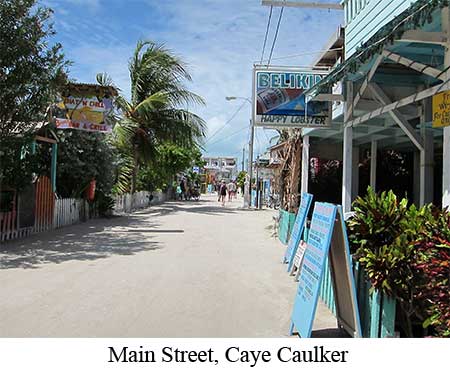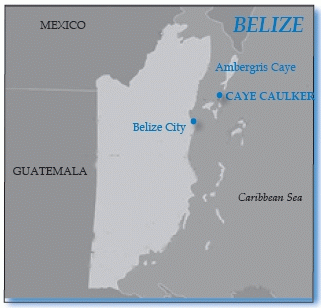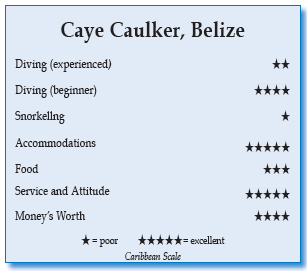Belize Diving Services, Caye Caulker, BelizeContents of this Issue: Blue Lagoon Resort, Chuuk, Micronesia Another Chuuk Option: the Truk Odyssey Flying to Micronesia? Options to Avoid United Belize Diving Services, Caye Caulker, Belize Bad Mistakes Dead Divers Make: Part II Why Not Make the Costa Concordia a Diver’s Paradise? DEPP: Off the Recommended List Five Websites That Makes Dive Travel Easier “Another” Recall for Aqua Lung’s SureLock Weight Pockets A Bad Dive Weekend Coast to Coast Humans Have Changed Stingrays’ Ways Editorial Office: Ben Davison Publisher and Editor Undercurrent 3020 Bridgeway, Suite 102 Sausalito, CA 94965 Old Caribbean living, the reality of current Caribbean diving from the April, 2013 issue of Undercurrent
South of Ambergris Caye, which developers have successfully Americanized in just two short decades, is the smaller, underdeveloped Caye Caulker. For those of us divers who pine for the old Caribbean, it provides a twitch of nostalgia. No cars are allowed, so the streets are sand. The village is a funky, laid-back development of maybe 1,300 souls of Hispanic or African origin, plus plenty of expats, who only recently had a public desalinated water system installed. On the oceanfront main street, vendors hawk souvenirs and street food, the kind that always tempts me and is bound to make me ill -- yup, after my first helping, diarrhea persisted throughout the trip. So I stuck to the real restaurants, similar to each other, either with picnic benches or tables set on the sand, or a wooden deck in open-air roofed buildings. Food doesn't vary much: fresh fish or lobster, roast chicken, pork chops or steak served with rice, beans and frequently cole slaw. At the "Italian" restaurant, my grilled fish, smothered in tomato sauce, of course came with rice and beans. Old Caribbean food, old Caribbean prices: A whole grilled lobster with sides cost US$10, a grilled snapper filet or kabob dinner was $9. Voluminous pina coladas cost $3. The old Belize dive operators weren't much to write home about, but Belize Diving Services (BDS) resembles a 21st century operation. Prior to our arrival, owner Chip Peterson asked me and my partner to submit our physician dive fitness forms, which he requires for folks over 65. Upon arrival, he was extremely helpful, and can supply custom 40-cfs bottles of EAN80 that I use for decompression (a safety margin for an illness). He made no attempt to sell us a "dive package;" the only requirement was a small deposit, the cost of a single two-tank dive.
On our first day, we dropped off our gear, and on the last day, we picked it up clean and dry. The Belizean crew assembled it on the boat, helped me walk to and/from the dive platform, and greeted me at the ladder. The young Belizean divemaster was always the last to board the boat. While dives were supposed to last 45 minutes, my buddy and I often stayed down 55 to 60 minutes. First dives were to a maximum depth of 80 feet; the second went to 60 feet. BDS divemasters assumed everyone could manage their own dives unless they asked for assistance -- how nice, as my new Scubapro Galileo was beeping up a concert for all kinds of silly "warning" reasons. They provide drinks and fresh fruit in between dives.
So, what about the diving? Well, it can be good, but it can also be disappointing if you've had a few tropical dives in fishy places. Among the better ones was a site on the fore reef, where we were promised nurse sharks and rays. Sure enough, the promise was kept. Once we descended, we followed our divemaster over fields of soft corals. Then he signaled us to stop. Suddenly several nurse sharks swam toward us, eventually so close that a number of our group went so far as to pet them. While we were occupied with the sharks, two spotted eagle rays circled around. In the soft corals, I saw several small hawksbill turtles gnawing on sponges. On our fifth diving day, we booked a long trip to Turneffe North ($110 per person) which required us to be at the shop by 9:30 a.m. The Newton provided a comfortable hour-long ride through bumpy waters, eventually carrying us into calmer waters at Turneffe North. The visibility was better than it had been on other dives, ranging from 30 to 60 feet, and the fish life and hard corals were more abundant than at the other sites. We swam among schools of fish, several morays, but no sharks or rays or sizeable fish. Between dives, the crew put on a hot buffet lunch of (wait for it) chicken, rice, and beans, along with coleslaw and fruit. But for the most part, our close-in dives were mostly barren of swimming fish as we finned above fields of soft corals swaying in the light current. I saw trumpetfish and a number of angelfish, but not much else. Weird, but I found myself falling asleep as I drifted on one 45-minute dive. (Now that is relaxation and boredom!) Most dives were termed "drift dives," although there wasn't much current. I assume that term just means the boat followed our bubbles so that if any diver ran low on air, he could surface and get easily picked up, allowing others to continue.
At Chip's suggestion, we stayed at Caye Reef, a six-unit condo across the street from the ocean and a small beach, and a 10-minute walk from the dive shop. All units are two-bedroom, two-bath units, fully equipped, spacious, clean and very comfortable, with strong A/C, filtered water and good, firm mattresses. There's even a local cell phone good for 10 calls. Each unit has a beachfront balcony with a clothesline, hammock and chairs. The building also had a private freshwater pool and a rooftop hot tub (there are no real swimming beaches on Caye Caulker). I had no difficulty buying food for breakfast, lunch and snacks; at one of two bakeries, I bought a fresh loaf of whole wheat bread for $1.25. Other shops sell fresh-squeezed, reasonably priced fruit juices. The small markets have limited stock, but I loved the fresh local eggs for breakfast. One warning: Canned and packaged food ought to be labeled "leftover," because many were far beyond their expiration dates. I could reliably guess the age of tinned items by the rust on the can. But the local fruit was delicious and readily available. With diving not much of a draw, we took a day trip to Lamanai, a large Mayan ruin on the mainland, which involved a water taxi, an hour-long van ride from Belize City, and a 26-mile speedboat ride on the New River. While looking at the one temple, a jaguar growled nearby, and screeching howler monkeys greeted us from the canopy. Now that was memorable, no matter how arduous the travel. If you're a beginning diver, Caye Caulker is just fine, especially because BDS's operation is first rate, and on the longer dives, you'll be assigned to a beginning group and have your own divemaster. For the rest of us, it's a fine place to hang out in what's left of the old Caribbean -- comfortable accommodations with private swimming pools, a village with a friendly population, adventures such as deep-sea fishing and crocodile tours, the spectacular inland attractions of Mayan ruins, ziplining in the jungle and whitewater rafting. Even though I might fall asleep on my next drift dive there, I'd still go back. -- J.N.F.
|

I want to get all the stories! Tell me how I can become an Undercurrent Online Member and get online access to all the articles of Undercurrent as well as thousands of first hand reports on dive operations world-wide
| Home | Online Members Area | My Account |
Login
|
Join
|
| Travel Index |
Dive Resort & Liveaboard Reviews
|
Featured Reports
|
Recent
Issues
|
Back Issues
|
|
Dive Gear
Index
|
Health/Safety Index
|
Environment & Misc.
Index
|
Seasonal Planner
|
Blogs
|
Free Articles
|
Book Picks
|
News
|
|
Special Offers
|
RSS
|
FAQ
|
About Us
|
Contact Us
|
Links
|
3020 Bridgeway, Ste 102, Sausalito, Ca 94965
All rights reserved.

 The BDS centerpiece is Chip's home --
a large concrete structure on stilts with
an "after-dive bar" underneath, and a large
shaded sitting area with plush chairs. Next
to that is a check-in/office building, with
a compressor/equipment storage building at
the rear. A lovely, palm tree-shaded waiting
area with picnic bench and Adirondack
chairs -- perfect for relaxing before
boarding the boats -- leads to the dock.
BDS's smaller boat is a super 27-footer
with a center tank rack and seats; take
your stride entry from the side and climb
aboard via a fixed ladder (waves made that difficult at times). BDS's 46-foot
Newton Dive Special is used for longer
trips outside Caye Caulker's reef.
She's equipped with a head, freshwater
showers, plenty of shady space, and
is a comfortable ride even during the
hour-long trip in four-foot waves to
Turneffe Island. Both boats had firstaid
kits and oxygen, and the Newton
even had a defibrillator.
The BDS centerpiece is Chip's home --
a large concrete structure on stilts with
an "after-dive bar" underneath, and a large
shaded sitting area with plush chairs. Next
to that is a check-in/office building, with
a compressor/equipment storage building at
the rear. A lovely, palm tree-shaded waiting
area with picnic bench and Adirondack
chairs -- perfect for relaxing before
boarding the boats -- leads to the dock.
BDS's smaller boat is a super 27-footer
with a center tank rack and seats; take
your stride entry from the side and climb
aboard via a fixed ladder (waves made that difficult at times). BDS's 46-foot
Newton Dive Special is used for longer
trips outside Caye Caulker's reef.
She's equipped with a head, freshwater
showers, plenty of shady space, and
is a comfortable ride even during the
hour-long trip in four-foot waves to
Turneffe Island. Both boats had firstaid
kits and oxygen, and the Newton
even had a defibrillator. We had decided to dive Caye Caulker in July, when seas are supposedly the
calmest, and the rainy season is over. Daytime temps were in the mid-80s with
a nice sea breeze. But the 45-minute taxi trip ($25) from Belize City to the
caye was a bit wet and rough; we covered the seats and ourselves with a tarp
to keep dry as we powered through a rain squall. Caye Caulker is five miles
long, half a mile wide and inside the long Belize Barrier Reef. The surrounding
waters are "lagoon-like," characterized by sand flats with beds of sea grass
and calm waters. Half a mile out, one can see waves breaking where the fore
reef plunges deep. We made six of our dives in that area, and took surface
intervals within the lagoon to avoid the heavy waves at the dive sites.
We had decided to dive Caye Caulker in July, when seas are supposedly the
calmest, and the rainy season is over. Daytime temps were in the mid-80s with
a nice sea breeze. But the 45-minute taxi trip ($25) from Belize City to the
caye was a bit wet and rough; we covered the seats and ourselves with a tarp
to keep dry as we powered through a rain squall. Caye Caulker is five miles
long, half a mile wide and inside the long Belize Barrier Reef. The surrounding
waters are "lagoon-like," characterized by sand flats with beds of sea grass
and calm waters. Half a mile out, one can see waves breaking where the fore
reef plunges deep. We made six of our dives in that area, and took surface
intervals within the lagoon to avoid the heavy waves at the dive sites. Sad to say, the lionfish appears to
be the national fish, which our divemaster
hunted religiously. In the spirit
of the hunt, we divers let him know
whenever we spotted one. After spearing
a lionfish, he placed it in a large
bag. Despite the spearfishing efforts,
we saw numerous lionfish on every dive,
and correspondingly, few juvenile fish. There was the occasional moray, angelfish,
spotted drum, parrotfish, trumpetfish,
blue tang, black durgon, yellowtail, grouper, squirrelfish, triggerfish
and blenny, and on one safety stop, a southern stingray. Despite lots of experience
spotting coral-banded shrimp on dives elsewhere in the Caribbean, I only
saw two on my eight dives. So I must characterize four of my eight dives as
boring, with little to see other than coral and sponges; we saw almost no fish
on two dives. That said, sponges and soft corals, including sea fans and fire
and brain coral, were abundant and healthy looking on every dive.
Sad to say, the lionfish appears to
be the national fish, which our divemaster
hunted religiously. In the spirit
of the hunt, we divers let him know
whenever we spotted one. After spearing
a lionfish, he placed it in a large
bag. Despite the spearfishing efforts,
we saw numerous lionfish on every dive,
and correspondingly, few juvenile fish. There was the occasional moray, angelfish,
spotted drum, parrotfish, trumpetfish,
blue tang, black durgon, yellowtail, grouper, squirrelfish, triggerfish
and blenny, and on one safety stop, a southern stingray. Despite lots of experience
spotting coral-banded shrimp on dives elsewhere in the Caribbean, I only
saw two on my eight dives. So I must characterize four of my eight dives as
boring, with little to see other than coral and sponges; we saw almost no fish
on two dives. That said, sponges and soft corals, including sea fans and fire
and brain coral, were abundant and healthy looking on every dive. Divers Compass: Belize Diving Service's daily two-tank dives
to sites just outside the lagoon are US$74.50 per person; farther-
away sites, such as Turneffe Atoll ($110), the Blue Hole
and the Lighthouse are six- to nine-hour trips . . . Both BDS
and Caye Reef accept MasterCard and Visa . . . The rate for
our off-season Caye Reef apartment was $180 per night, with a
50-percent deposit required . . . We booked the Lamanai tour
with Tsunami Adventures, right next door to Caye Reef; the $96
per-person rate included a lunch of beans, chicken and rice,
cooked by the guide's mother . . . Websites: Belize Diving Services -
Divers Compass: Belize Diving Service's daily two-tank dives
to sites just outside the lagoon are US$74.50 per person; farther-
away sites, such as Turneffe Atoll ($110), the Blue Hole
and the Lighthouse are six- to nine-hour trips . . . Both BDS
and Caye Reef accept MasterCard and Visa . . . The rate for
our off-season Caye Reef apartment was $180 per night, with a
50-percent deposit required . . . We booked the Lamanai tour
with Tsunami Adventures, right next door to Caye Reef; the $96
per-person rate included a lunch of beans, chicken and rice,
cooked by the guide's mother . . . Websites: Belize Diving Services - 